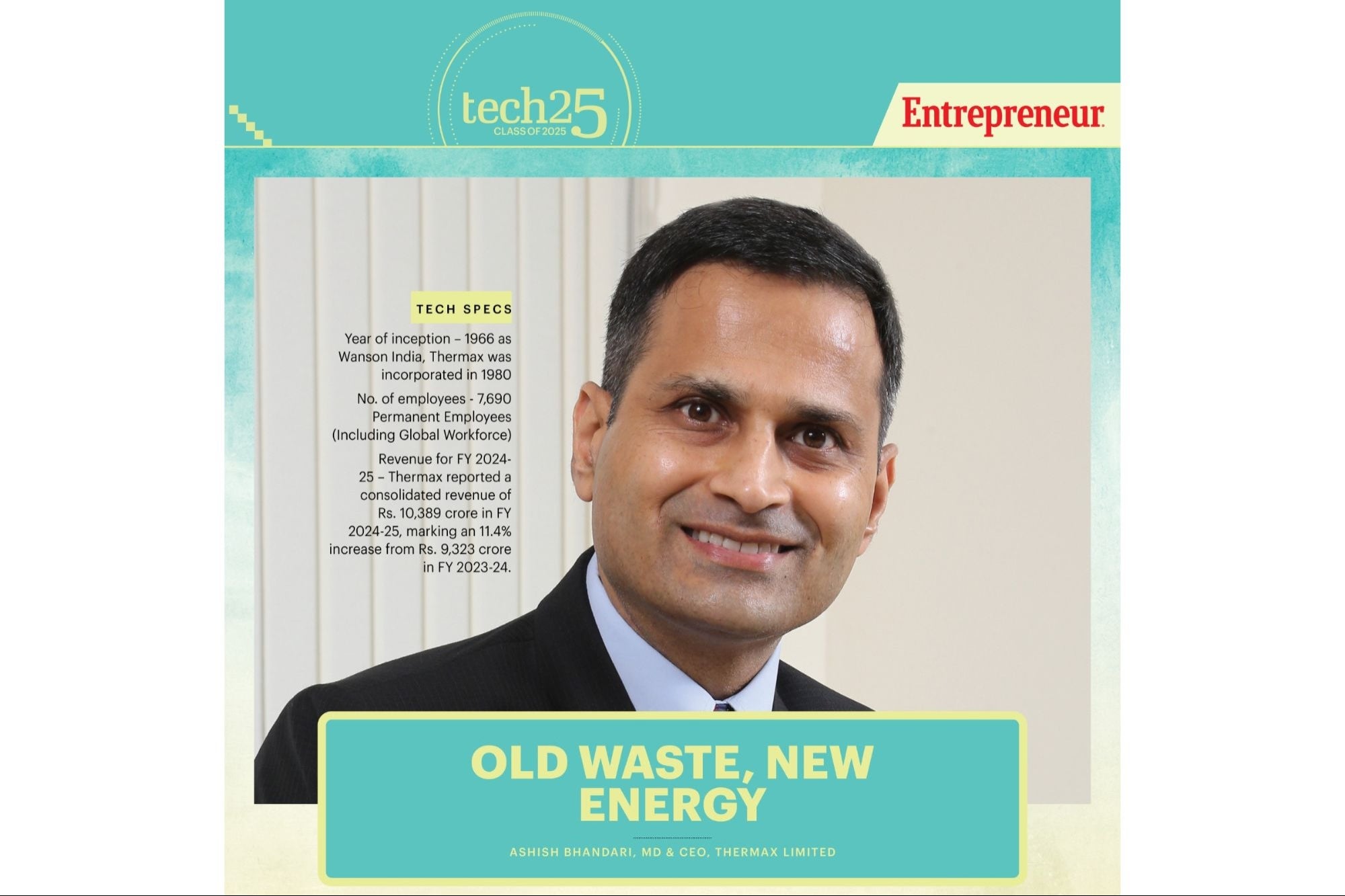Old Waste, New Energy: Ashish Bhandari, MD & CEO, Thermax Limited As the world scrambles for cleaner energy and tighter efficiency, India's Thermax Limited is doing something refreshingly rare: putting its money, talent, and tech where its mission is.
Opinions expressed by Entrepreneur contributors are their own.
You're reading Entrepreneur India, an international franchise of Entrepreneur Media.

As the world scrambles for cleaner energy and tighter efficiency, India's Thermax Limited is doing something refreshingly rare: putting its money, talent, and tech where its mission is. And at the helm of this transformation is Ashish Bhandari, the MD & CEO who's steering the 58-year-old engineering firm into the thick of the energy transition.
"We are very focused on being a partner in energy transition to our customers. Which means almost everywhere there is energy," states Bhandari. From petrochemical giants to potato chip factories, the company's footprint is as diverse as the fuels it's transforming. At a time when energy headlines are dominated by solar panels and hydrogen dreams, Thermax is quietly turning agricultural waste, flue gases, and even potato steam into power, profit, and planetary goodwill.
Waste-to-energy isn't just a line item on a sustainability report here; it's the center of gravity. Bhandari doesn't mince words about it. "The single biggest area where I can talk about is this whole waste-to-energy area." From converting palm industry waste like empty fruit bunches in Southeast Asia to tackling India's Parali grass — the smog-inducing scourge of northern winters — Thermax is aggressively building capability. In fact, in Thermax's industrial heating range, biomass already accounts for more than 70 per cent of its sales. That's not a gentle pivot; that's a power slide.
One minute you're hearing about mustard stalks being turned into fuel, and the next, about cutting-edge Flexi Source systems that can run on up to 11 different kinds of fuels. "More importantly," Bhandari points out, "we take what is wasted within the plant currently and give it back to them in the form of useful energy." The company captures the steam from potato frying, uses it to power chillers for cooling, and recycles the recovered water vapor back into the system to wash more potatoes. It's the industrial equivalent of eating your chips and having them too.
Thermax's IIoT platform, Edge Live, has seen breakneck adoption since launching in 2022. It now monitors over 4,800 assets across 200+ plants in 22 countries. "We want to be able to monitor a variety of data that industrial plants give out," Bhandari says, "starting with assets that Thermax is particularly comfortable with and we know very well, which are at the heart of energy for any given plant." Edge Live isn't just about uptime; it's about insight — unlocking 2 to 10 per cent efficiency gains with machine learning, diagnostics, and real-time analytics.
But for all its current scale, the real drama lies in what's next. Thermax is placing serious bets on hydrogen, carbon capture, and advanced biofuels — technologies that are still warming up in the bullpen. "We are doing our own R&D in areas around hydrogen, even some specifics of carbon capture," Bhandari shares. The company is also engaging in strategic partnerships with firms like Ceres Power and Steinmüller, and even dabbling in acquisitions; all part of a three-pronged strategy to stay ahead in a volatile, innovation-heavy market.
Of course, not all experiments go according to plan. "Last year, Thermax lost a fair bit of money in stabilizing these bio-CNG plants," Bhandari admits. Driving all this is a cultural shift that might be the company's most transformative work yet. The company has revamped leadership development to cultivate a growth mindset, brought in global talent for R&D, and embedded innovation into its DNA.
For a company once best known for boilers, that's quite the heat-up. In a major industry of India, if not the world, Thermax is delivering results — sometimes in kilowatts, sometimes in clean air, and increasingly, in data.
Factsheet:
- Year of inception – 1966 as Wanson India, Thermax was incorporated in 1980
- No. of employees - 7,690 Permanent Employees (Including Global Workforce)
- Revenue for FY 2024-25 – Thermax reported a consolidated revenue of Rs. 10,389 crore in FY 2024-25, marking an 11.4% increase from Rs. 9,323 crore in FY 2023-24.
- Major clients – Across all industries in India and globally. Some of the major sectors, as per the FY25 order book include, Metals/Steel, Power, Mining, Food and Beverages, Chemical, Sugar/Distillery
- Thermax EDGE Live® numbers – The AI/ML-powered IIoT platform since its launch in June 2022, has been adopted by over 195 customers across 22+ countries, monitoring 4,800+ assets associated with 200+ units.










